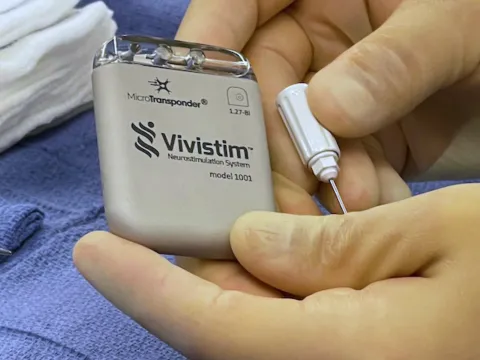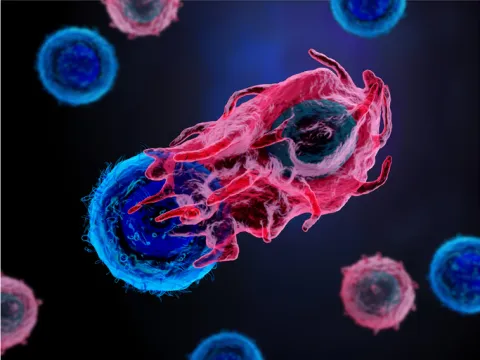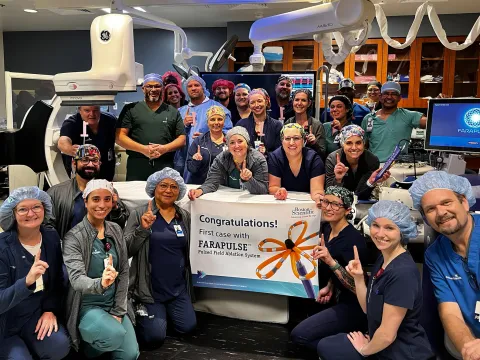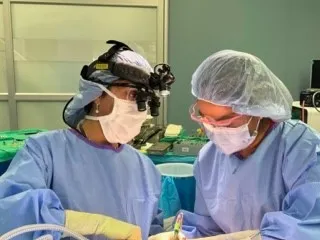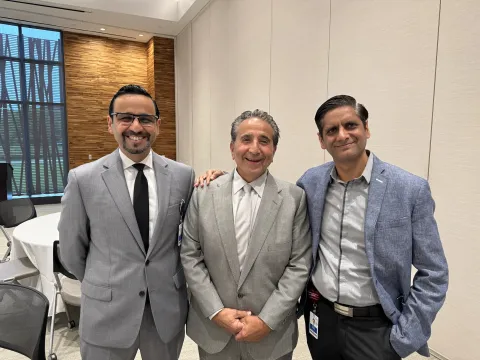- AdventHealth
Choose the health content that’s right for you, and get it delivered right in your inbox.
Melvin Field, MD
Co-director, Neuro-Oncology Program
Medical Director, Minimally Invasive Brain Surgery
AdventHealth Cancer Institute
Imran Mohiuddin, MD
Director
CNS Radiation Oncology
AdventHealth Cancer Institute

AdventHealth Orlando recently became the first site in Central Florida to utilize GammaTile brachytherapy for the treatment of a metastatic brain lesion. Melvin Field, MD, Medical Director of AdventHealth’s Minimally Invasive Brain Surgery program and Co-Director of the Neuro-Oncology program, worked in partnership with Imran Mohiuddin, MD, Director of CNS Radiation Oncology for AdventHealth Cancer Institute, to utilize this breakthrough technology.
Each individual GammaTile comprises a 2 cm x 2 cm x 4 mm collagen matrix embedded with Cesium-131 radioactive seeds. An appropriate number of tiles (pre-determined based on anticipated surgical cavity size) are used to line the tumor bed after the tumor is maximally resected. GammaTiles begin killing cancer cells right away through emission of radiation. Each tile lasts for approximately six weeks before the biodegradable collagen matrix is naturally absorbed into the body, leaving behind only biologically inert seeds that are no longer radioactive. From the patient’s perspective, there is no apparent change in their length of hospital stay or outpatient surveillance.
Using this strategy, a therapeutic dose of 60 Gy is precisely delivered to the tumor bed and immediately starts treating any potential microscopic residual disease. By comparison, the workflow for conventional external beam/tele-radiotherapy would necessitate a requisite amount of healing time prior to adjuvant radiotherapy (i.e., giving residual disease time to regrow and spread). Also, since the GammaTile brachytherapy radiation dose only penetrates to 5 mm tissue depth, radiation dosing can still be very high with minimal risk to adjacent sensitive structures or previously irradiated tissues.
“We are limited with what we can do for certain brain cancers and even for some non-cancerous brain tumors,” said Dr. Field. “GammaTile gives us yet another tool to fight cancer on behalf of our patients and their families.”
Dr Mohiuddin said, “GammaTile is uniquely helpful because it begins working immediately after placement into the brain. The patient does not have to wait to heal from surgery before beginning the next phase of treatment, which means the cancer has less time to regrow before starting radiation.”
“It is very focal,” Mohiuddin said. “We can do an excellent job of giving a very high dose of radiation to only the problem areas while sparing healthy brain tissue that is even millimeters away. In general, these features translate to higher rates of cure while also sparing patients from difficult side effects of treatment, such as brain damage or hair loss.”
GammaTile, which was approved by the FDA less than two years ago, can be used as a first- or second-line treatment for intracranial tumors. Dr Field and Dr Mohiuddin have already successfully performed 2 GammaTile cases for patients with brain tumors which had continued to grow in spite of previous conventional therapy.
For more information or to refer a patient, call Neuro-Oncology Nurse Navigator Carol Peacock, MSN, RN, OCN, at Call407-303-2770, ext. 1224233; or contact Minimally Invasive Brain Surgery Manager Aiko Boggs by fax at Call407-303-2725, or by email at nsi.brain.services@adventhealth.com.
Recent News
Accurately determining food intake remains a challenge in nutrition research. A new study published in Nature Metabolism and co-authored by Dr. Corbin introduces a metagenomics-powered approach to...
Discover what’s being accomplished in Central Florida to bridge the health gap with Orange County Mayor Jerry Demings and AdventHealth’s Dr. Alric Simmonds.
Breakthrough device offers new hope for stroke survivors struggling with rehabilitation following ischemic stroke
Jennifer Seminerio, MD, recently became one of the first in Florida to use intestinal ultrasound (IUS) to help assess and manage treatment of patients with inflammatory bowel disease (IBD). A non...
Physician leaders from AdventHealth’s emergency department, infectious disease, inpatient, pediatrics and pharmacy teams all collaborated to develop a respiratory virus testing algorithm to assist...
Thoracic surgeon Colleen Gaughan, MD, and her team at AdventHealth Celebration, recently became one of the first in the country to incorporate targeted imaging agent Cytalux (pafolacianine) as part of...
On the newest Inspiring Wholeness podcast, Obie Diaz, local morning radio show host, shares how a routine physical eventually led to two open heart surgeries.
AdventHealth recently began piloting a new Genomics Risk Assessment for Cancer and Early Detection (GRACE) program that combines the use of digital mammography, artificial intelligence (AI) technology...
AdventHealth Clinical Research Unit (CRU) Executive Director and Medical Director of Genitourinary Oncology Guru Sonpavde, MD, co-authored an article on the AMBASSADOR Phase III clinical trial results...
A promising new treatment for AFib patients called Pulse Field Ablation is first offered in Central Florida at AdventHealth and shows less damage to tissue.
Plastic and Reconstructive Microsurgeon Sabrina Pavri, MD, and Breast Surgeon Devina McCray, MD, recently began offering immediate neurotization after breast reconstruction, a new surgical technique...
Under the leadership of gynecologist and gynecological surgeon Omar Zwain, MD, AdventHealth for Women opened its new, multidisciplinary Comprehensive Fibroid Program at AdventHealth Winter Park in...



